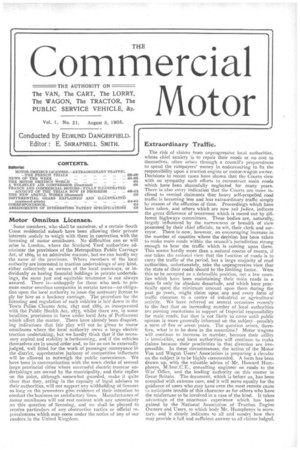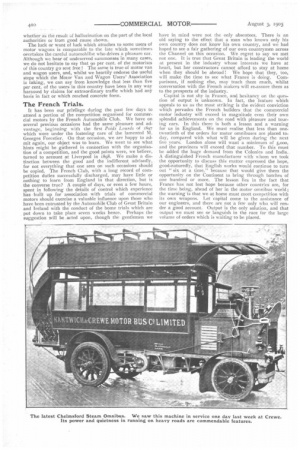Motor Omnibus Licenses.
Page 1

Page 2

If you've noticed an error in this article please click here to report it so we can fix it.
Some members, who shall be nameless, of a certain South Coast residential suburb have been allowing their private interests unduly to weigh with them in connection, with the licensing of motor omnibuses. No difficulties can or will arise in London, where the Scotland Yard authorities administer the provisions of the Metropolitan Public Carriage Act, of 1869, in an admirable manner, but we can hardly say the same of the provinces. Where members of the local authority are interested in traction undertakings of any kind, either collectively as owners of the local tramways, or individually as having financial holdings in private undertakings, the same just and equitable treatment is not always assured. There is—unhappily for those who seek to promote motor omnibus companies in certain towns—no obligation upon the local authority to issue the necessary license to ply for hire as a hackney carriage. The procedure for the licensing and regulation of such vehicles is laid down in the Town Police Clauses Acts, 1847 and 188o, as incorporated with the Public Health Act, 1875, whilst there are, in some localities, provisions in force under local Acts of Parliament which affect the matter. There have already been disquieting indications that fair play will not be given to motor omnibuses where the local authority owns a large electric traction undertaking, but we hardly think that if the necessary capital and stability is forthcoming, and if the vehicles themselves are in sound order and, so far as can be externally judged, well fitted for the work of passenger conveyance in the district, apprehensive jealousy of competitive influences will be allowed to outweigh the public convenience. We have been in communication with the town clerks of several large provincial cities where successful electric.tramcar undertakings are owned by the municipality, and their replies on the point, although somewhat guarded, make it quite clear that they, acting in the capacity cif legal advisers to their authorities, will not support any withholding of licenses so long as the promoters give evidence of their intention to conduct the business on satisfactory lines. Manufacturers of motor omnibuses will not rest content with any uncertainty on this question of licensing, and we shall be pleased to receive particulars of any obstructive tactics or official repressiveness which may come under the notice of any of our readers in the United Kingdom.
Extraordinary Traffic.
The risk of claims from unprogressive local authorities, whose chief anxiety is to repair their roads at no cost to themselves, often arises through a council's preparedness to spend the ratepayers' money in endeavouring to fix the responsibility upon a traction engine or motor-wagon owner. Decisions in recent eases have shown that the Courts view with no sympathy such efforts to reconstruct main roads which have been shamefully neglected for many years. There is also every indication that the Courts are more inclined to remind claimants that heavy self-propelled road traffic is becoming less and less extraordinary traffic simply by reason of the &Fluxion of time. Proceedings which have been taken, and others which are now sub judice, indicate the great difference of treatment which is meted out by different highways committees. These bodies are, naturally, largely influenced by the narrowness or breadth of view possessed by their chief officials, to wit, their clerk and surveyor. There is now, however, ark encouraging increase in the number of counties where the decision has been taken to make main roads within the council's jurisdiction strong enough to bear the traffic which is coming upon them. This seems hardly more than a natural course of events, if one takes the rational view that the function of roads is to carry the traffic of the period, but a large majority of road authorities, unfortunately, take the unprogressive view that the state of their roads should be the limiting factor. Were this to be accepted as a defensible position, not a few counties which have been maintaining their main roads in a state fit only for absolute desuetude, and which have practically spent the minimum amount upon them during the past so years, might claim upon any and every form of traffic common to a centre of industrial or agricultural activity. We have referred on several occasions recently to the fact that an increasing number of local authorities are passing resolutions in support of Imperial responsibility for main roads, but that is not likely to come until public opinion is more generally informed on the subject--possibly a term of five or seven years. The question arises, therefore, what is to be done in the meantime? Motor wagons will continue to increase in number, because their utility is irresistible, and local authorities will continue to make claims because their proclivities in that direction are irrepressible. In these circumstances, the action of the Motor Van and Wagon Users' Association in preparing a circular on the subject is to be highly commended. A form has been drawn up, with the valuable advice of Mr. Howard Humphreys, M.Inst.C.E., consulting engineer on roads to the War Office, and the leading authority on this matter in Great Britain. The document, which is before us, has been compiled with extreme care, and it will serve equally for the guidance of users who may have even the most remote cause to anticipate trouble of this character as for others who have the misfortune to be involved in a case of the kind. It takes advantage of the enormous experience which has been gained by the National Association of Traction Engine Owners and Users, to which body Mr. Humphreys is secretary, and it clearly indicates to all and sundry how they may provide a full and sufficient answer to all claims lodged,
whether as the result cif hallucination on the part of the local authorities or from good cause shown.
The luck or want of luck which attaches to some users of motor wagons is comparable to the fate which sometimes overtakes the careful automobilist who drives a pleasure car. Although we hear of undeserved summonses in many cases, we do not hesitate to say that go petcent. of the motorists of this country go scot free ! The same is true of motor van and wagon users, and, whilst we heartily endorse the useful steps which the Motor Van and Wagon Users' Association is taking, we can say from knowledge that less than five per cent, of the users in this country have been in any way harassed by claims for extraordinary traffic which had any basis in fact or which reached concrete form.
The French Trials.
It has been our privilege during the past few days to attend a portion of the competition organised for commercial motors by the French Automobile Club. We have on several previous occasions had the same pleasure and advantage, beginning with the first Poids Lourds of iflo7 which were under the fostering care of the lamented M. Georges Forestier. On that occasion, we are happy to admit again, our object was to learn. We went to see what hints might be gathered in connection with the organisation of a competition, and the good points were, we believe, turned to account at Liverpool in ISO. We make a distinction between the good and the indifferent advisedly, for not everything that one sees on such occasions should be copied. The French Club, with a long record of competition duties successfully discharged, may have little or nothing to learn from England in that direction, but is the converse true? A couple of days, or even a few hours, spent in following the details of control which experience has built up for association with trials of commercial motors should exercise a valuable influence upon those who have been entrusted by the Automobile Club of Great Britain and Ireland with the conduct of the home trials which are put down to take place seven weeks hence. Perhaps the suggestion will be acted upon, though the gentlemen we
have in mind were not the only absentees, There is an old saying to the effect that a man who knows only his own country does not know his own country, and we had hoped to see a fair gathering of our own countrymen across the Channel on this occasion. We regret to say we met not one. It is true that Great Britain is leading the world at present in the industry whose interests we have at heart, but her constructors cannot afford to stay at home when they should be abroad! We hope that they, too, will make the time to see what France is doing. Comparisons, if nothing else, may teach them much, whilst conversation with the French makers will re-assure them as to the prospects of the industry. Capital is not shy in France, and hesitancy on the question of output is unknown. In fact, the feature which appeals to us as the most striking is the evident conviction which pervades the French builders that the commercial motor industry will exceed in magnitude even their own splendid achievements on the. road with pleasure and touring cars. In this there is both a lesson and a warning for us in England. We must realise that less than onetwentieth of the orders for motor omnibuses are placed today, compared with what will be given during the next five years. London alone will want a minimum of 5,000, and the provinces will exceed that number. To this must be added the huge demand from the Colonies and India. A distinguished French manufacturer with whom we took the opportunity to discuss this matter expressed the hope, good-naturedly, that English works would continue to turn out "sit at a time," because that would give them the opportunity on the Continent to bring through batches of one hundred or more. The lesson lies in the fact that France has not lost hope because other countries are, for the time being, ahead of her in the motor omnibus world; the warning is that we at home must meet competition with its own weapons. Let capital come to the assistance of our engineers, and there are not a few only who will render a good account. Output is the only solution, and that output we must see or languish in the race for the large volume of orders which is waiting to be placed.


















